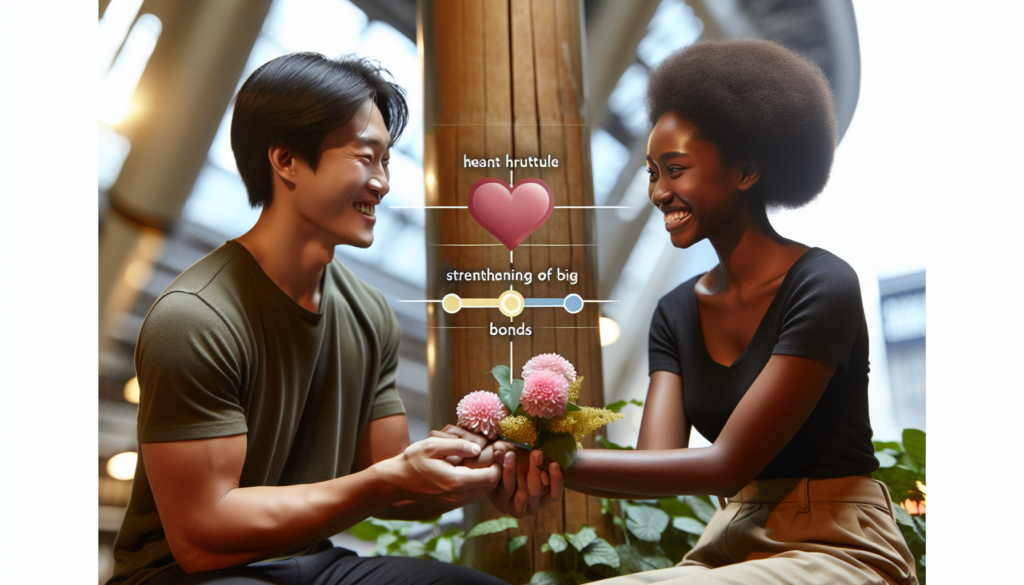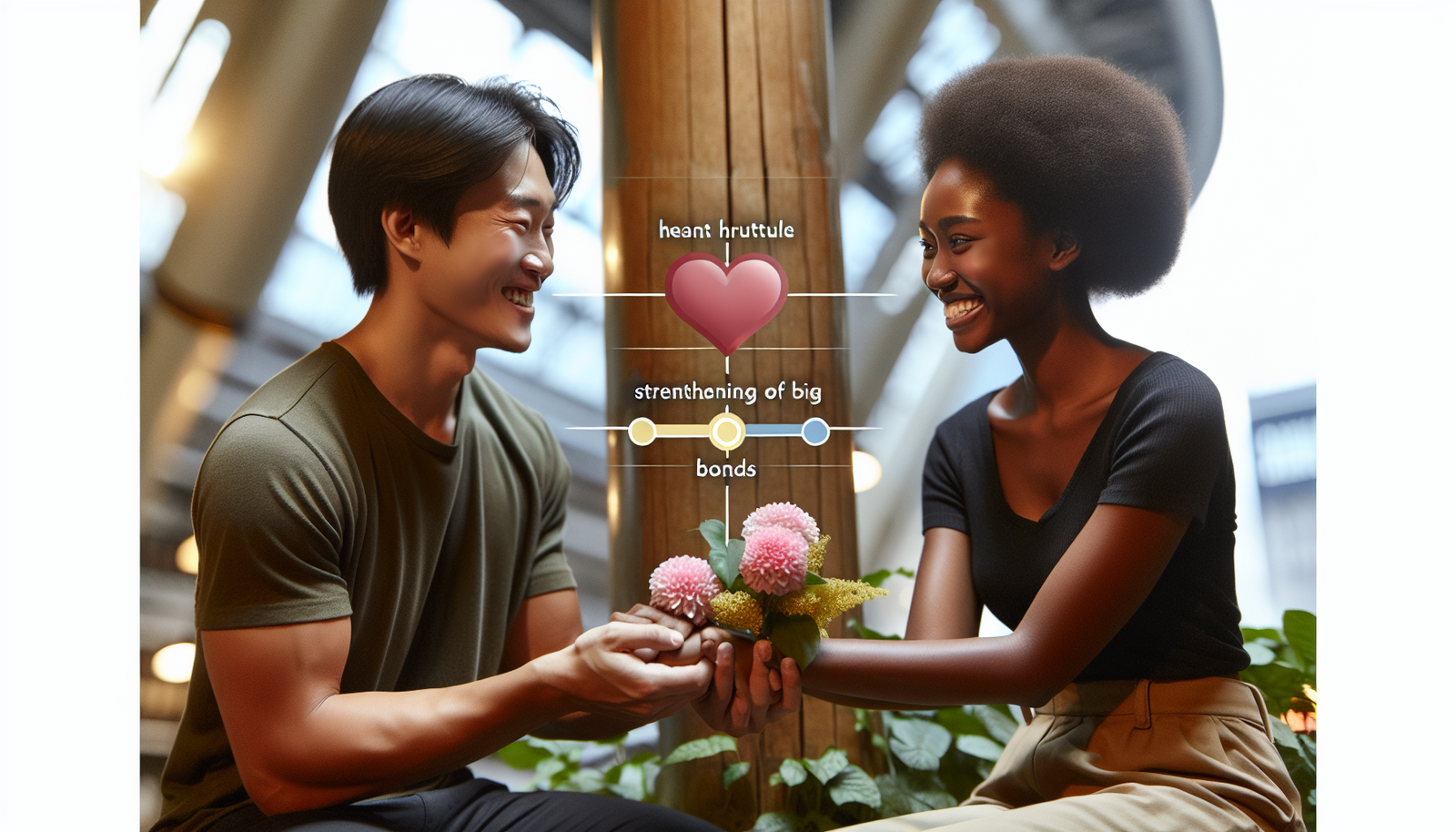In this article, you will explore the powerful impact of practicing active appreciation and expressing love languages in strengthening emotional bonds. By recognizing and valuing the efforts and qualities of your loved ones, you have the opportunity to deepen and strengthen your connection with them. Discover how this simple act of appreciating and understanding their unique needs can enhance your relationships and create an atmosphere of love and happiness. Get ready to embark on a journey of enriching your emotional ties through the practice of active appreciation.

I. Understanding Active Appreciation
A. Definition and Concept of Active Appreciation
Active appreciation refers to the intentional and proactive expression of gratitude, love, and affection towards others. It goes beyond simply feeling thankful or affectionate and extends to actively demonstrating and communicating these emotions to the people we care about. Active appreciation involves recognizing and valuing the positive qualities, contributions, and efforts of others, and expressing this appreciation through words, gestures, and actions. It is an essential aspect of nurturing and strengthening emotional bonds in relationships.
B. Love Languages and Emotional Expressions
Understanding love languages is crucial in effectively expressing and receiving active appreciation. Love languages are the different ways individuals prefer to give and receive love and affection. These love languages include words of affirmation, acts of service, receiving gifts, quality time, and physical touch. By identifying and understanding our own and our loved ones’ love languages, we can tailor our expressions of active appreciation to resonate with them on a deeper level, enhancing the emotional connection and fostering greater intimacy in our relationships.
C. Implications for Strengthening Emotional Bonds
Practicing active appreciation has numerous positive implications for strengthening emotional bonds. By consistently expressing gratitude, love, and affection, we create a positive and nurturing environment that fosters deeper emotional connections. When we actively appreciate others, we validate their worth and importance in our lives, boosting their self-esteem and creating a sense of belonging. This, in turn, strengthens the foundation of emotional bonds, promoting trust, loyalty, and feelings of security.
II. The Power of Gratitude in Building Emotional Connection
A. Gratitude as a Pillar of Emotional Connection
Gratitude plays a fundamental role in building and sustaining emotional connection. When we express gratitude towards someone, we acknowledge and appreciate their presence, actions, and qualities. This recognition and appreciation create a sense of value and significance, deepening the emotional bond between individuals. Gratitude fosters a positive emotional state, both in the giver and the receiver, promoting overall well-being and contentment within the relationship.
B. The Psychological and Physiological Effects of Gratitude
Research has shown that practicing gratitude has a profound impact on mental and emotional well-being. Expressing gratitude activates neural pathways associated with happiness and satisfaction, leading to improved mood and emotional resilience. Moreover, gratitude stimulates the release of neurotransmitters such as dopamine and serotonin, which contribute to feelings of joy and overall emotional balance. Physiologically, gratitude has been found to lower stress levels, boost the immune system, and improve sleep quality, all of which can positively impact emotional bonds within relationships.
C. Expressing Gratitude in Relationships
To strengthen emotional bonds through gratitude, it is vital to express appreciation effectively. Simple acts such as saying “thank you,” writing heartfelt notes, or complimenting and highlighting specific qualities, actions, or efforts of your loved ones can go a long way. Regularly expressing gratitude builds a culture of appreciation within the relationship, creating an atmosphere of warmth, love, and emotional well-being. It is essential to be genuine and sincere when expressing gratitude to ensure its impact on emotional bonds.
III. The Role of Effective Communication in Nurturing Emotional Bonds
A. Communication Styles and Emotional Connection
Effective communication is a cornerstone of nurturing emotional bonds. Different communication styles can either enhance or hinder emotional connection within relationships. A communication style that involves active listening, empathy, and open dialogue fosters understanding, deepens emotional intimacy, and strengthens relationships. On the other hand, poor communication, characterized by defensiveness, criticism, or lack of genuine engagement, can lead to misunderstandings, conflicts, and emotional distance.
B. Listening and Responding with Empathy
Active appreciation necessitates active listening and responding with empathy. When we listen attentively to our loved ones and seek to understand their thoughts, feelings, and needs, we create a safe and supportive space for emotional expression. Empathetic responses, such as validating emotions, offering understanding, and providing comfort, strengthen the emotional connection by demonstrating care, concern, and a willingness to support our loved ones unconditionally.
C. Creating Safe Spaces for Communication
Establishing safe spaces for open and honest communication is vital for nurturing emotional bonds. It involves creating an environment where individuals feel comfortable expressing themselves without fear of judgment or rejection. Active appreciation can be fostered by actively practicing non-judgmental listening, honoring boundaries, and encouraging open dialogue. By providing a safe space, emotional needs can be met, conflicts resolved, and emotional intimacy deepened, fostering stronger bonds.
IV. Benefits of Practicing Active Appreciation in Romantic Relationships
A. Enhanced Intimacy and Connection
Active appreciation plays a significant role in fostering intimacy and connection in romantic relationships. By consistently expressing love, admiration, and gratitude, partners deepen their emotional bond, experiencing a sense of closeness and union. Regular displays of active appreciation validate each partner’s worth and efforts, reinforcing emotional connection and creating a shared sense of appreciation and recognition.
B. Mutual Understanding and Validation
Practicing active appreciation facilitates mutual understanding and validation within romantic relationships. By actively expressing appreciation for each other’s love languages, partners can better understand and fulfill each other’s emotional needs. This understanding strengthens emotional bonds by creating a sense of validation and acceptance, enhancing emotional compatibility, and promoting harmony and empathy.
C. Building Trust and Security
Active appreciation contributes to building trust and security in romantic relationships. By consistently acknowledging and appreciating each other’s qualities, actions, and efforts, partners feel valued, loved, and secure within the relationship. The expression of active appreciation fosters a sense of trust, as partners feel confident in each other’s commitment and emotional investment. This trust forms a solid foundation for emotional bonds to flourish and deepens the sense of security within the relationship.

V. Strengthening Emotional Bonds through Active Appreciation in Familial Relationships
A. Fostering Supportive and Loving Environments
Practicing active appreciation within familial relationships creates supportive and loving environments. Expressing gratitude, love, and affection within the family unit promotes emotional well-being and a sense of belonging. Family members who actively appreciate each other’s efforts and presence foster an atmosphere of warmth, acceptance, and support. This, in turn, strengthens emotional bonds and fosters a deep sense of togetherness and unity.
B. Improving Parent-Child Relationships
In parent-child relationships, active appreciation is crucial for nurturing emotional bonds. Parents who express genuine gratitude, love, and admiration for their children create a positive emotional climate, enhancing the parent-child bond. Regularly acknowledging a child’s achievements, efforts, and unique qualities helps build their self-esteem, leading to stronger emotional connections and a sense of security. In turn, children who express appreciation towards their parents foster mutual respect, gratitude, and emotional closeness.
C. Siblings and Extended Family Bonds
Active appreciation also strengthens emotional bonds between siblings and extended family members. Expressing gratitude, recognition, and love towards siblings and extended family members creates a sense of belonging and solidarity. Regular acts of kindness, celebrating each other’s milestones, and recognizing individual strengths within the family unit foster stronger emotional connections and contribute to a supportive and loving family dynamic.
VI. The Impact of Active Appreciation in Friendships
A. Deepening Emotional Connection
Active appreciation has a profound impact on deepening emotional connections in friendships. By expressing gratitude, love, and admiration towards our friends, we demonstrate the value and importance they hold in our lives. Sharing heartfelt compliments, expressing gratitude for their presence, and acknowledging their contributions strengthens the emotional bond and fosters a sense of emotional intimacy. Friends who actively appreciate each other form deeper connections and experience a heightened sense of friendship.
B. Promoting Trust and Loyalty
Active appreciation promotes trust and loyalty within friendships. By consistently expressing appreciation, we create an environment of trust, as friends feel valued, respected, and supported. Friends who actively appreciate each other’s unique qualities, provide emotional support, and celebrate each other’s successes build a strong foundation of trust and loyalty. This trust strengthens emotional bonds and encourages open communication, vulnerability, and a lasting friendship.
C. Friendship Rituals and Expressions of Appreciation
Friendship rituals and expressions of appreciation play a significant role in strengthening emotional bonds. Sharing meaningful experiences, creating traditions, and engaging in acts of kindness and support contribute to the emotional connection between friends. Celebrating birthdays, anniversaries, and milestones, as well as regularly expressing gratitude and admiration, deepen the emotional bond and foster a sense of belonging and joy within the friendship.
VII. Overcoming Challenges in Implementing Active Appreciation
A. Barriers to Expressing Appreciation
Implementing active appreciation can encounter various barriers that hinder its practice. One of the main barriers is the assumption that appreciation is implied and does not need to be explicitly expressed. Additionally, some individuals may struggle with vulnerability or fear of rejection, making it challenging to openly express their feelings. Cultural and societal norms that discourage emotional expression or prioritize self-reliance can also pose challenges. Recognizing and addressing these barriers is crucial to foster a culture of active appreciation in relationships.
B. Addressing Communication Issues
Communication issues can impede the implementation of active appreciation. Misunderstandings or lack of effective communication styles can hinder the emotional connection and prevent the sincere expression of appreciation. It is essential to address communication issues by practicing active listening, promoting open dialogue, and seeking to understand and address any underlying conflicts or challenges. By improving communication, we create a conducive environment for active appreciation to flourish.
C. Overcoming Resistance and Negativity
Resistance and negativity can pose significant challenges in implementing active appreciation. Some individuals may resist or reject expressions of appreciation due to previous negative experiences or fear of vulnerability. Overcoming resistance requires patience, empathy, and consistent efforts to foster trust and emotional safety within relationships. By actively engaging in open and honest communication and demonstrating persistent positivity, we can gradually overcome resistance and negativity and create space for active appreciation to thrive.
VIII. Research Studies and Expert Opinions on Active Appreciation
A. Findings from Psychological and Relationship Studies
Psychological and relationship studies have consistently highlighted the positive impact of active appreciation on emotional bonds. Research shows that expressing gratitude and appreciation enhances relationship satisfaction, promotes empathy, and reduces conflict. Studies have also found a correlation between active appreciation and overall well-being, demonstrating its importance in nurturing emotional connections and promoting psychological health.
B. Insights from Relationship and Communication Experts
Relationship and communication experts stress the significance of active appreciation in building and sustaining emotional bonds. They emphasize the importance of expressing gratitude, practicing effective communication, and understanding love languages as essential tools for nurturing relationships. These experts advocate for the consistent implementation of active appreciation as a means to foster emotional intimacy, create a positive emotional climate, and strengthen the depth and quality of emotional connections.
C. Case Studies and Personal Experiences
Numerous case studies and personal experiences support the power of active appreciation in strengthening emotional bonds. Real-life accounts demonstrate how practicing active appreciation has transformed relationships by fostering mutual understanding, deepening emotional connection, and promoting lasting bonds. These accounts serve as powerful examples of the transformative impact active appreciation can have on relationships, reinforcing the importance of its incorporation into daily life.
IX. Strategies for Incorporating Active Appreciation into Daily Life
A. Mindfulness and Gratitude Practices
Incorporating mindfulness and gratitude practices into daily life is an effective strategy for nurturing active appreciation. Mindfulness cultivates a present-moment focus, allowing us to notice and appreciate the positive aspects of our relationships. Gratitude practices, such as keeping a gratitude journal or engaging in daily gratitude rituals, prompt us to actively acknowledge and express appreciation for the people and experiences we cherish. These practices strengthen our ability to actively appreciate and deepen our emotional bonds.
B. Sharing Love Languages and Understanding Needs
Sharing love languages and understanding each other’s emotional needs is essential for incorporating active appreciation into daily life. By discussing and identifying love languages, we gain insights into how to express appreciation in ways that resonate deeply with our loved ones. Understanding and meeting each other’s needs contributes to a more fulfilling and connected relationship, where active appreciation becomes a natural part of daily interactions and strengthens emotional bonds.
C. Small Gestures and Acts of Kindness
Incorporating small gestures and acts of kindness into daily life can significantly contribute to active appreciation. Simple actions like leaving uplifting notes, taking care of household chores, preparing a favorite meal, or offering a listening ear demonstrate active appreciation and reinforce emotional bonds. These small acts of kindness communicate love and gratitude, fostering a culture of appreciation and nurturing emotional connections throughout daily life.
X. Conclusion
A. Recap of the Importance of Active Appreciation
Active appreciation plays a vital role in strengthening emotional bonds in various relationships. It involves expressing gratitude, love, and affection through words, gestures, and actions, taking into account the individual’s love language. Active appreciation fosters deep emotional connection, enhances intimacy, promotes mutual understanding and validation, builds trust and security, and improves overall well-being within relationships.
B. Encouragement to Strengthen Emotional Bonds
Strengthening emotional bonds through active appreciation brings immense joy, fulfillment, and harmony to relationships. By actively appreciating our loved ones, we create a positive emotional climate where individuals feel valued, respected, and supported. Strengthening emotional bonds contributes to healthier, more meaningful relationships that enrich our lives and the lives of those we care about.
C. Call to Action for Practicing Active Appreciation
As you reflect on the impact of active appreciation and the benefits it brings, take the initiative to practice it in your daily life. Start by expressing gratitude, love, and affection to those around you, taking into account their unique needs and love languages. Be mindful of fostering effective communication, creating safe spaces for emotional expression, and overcoming challenges that may hinder active appreciation. Embrace the power of active appreciation and watch as your relationships flourish with deeper emotional connections and greater fulfillment.



